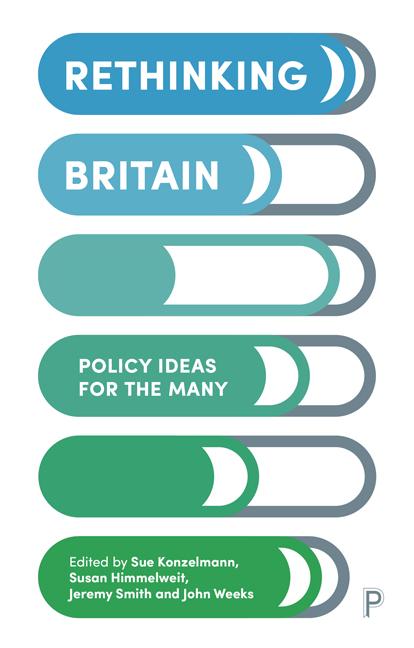Book contents
- Frontmatter
- Contents
- List of Tables and Figures
- The Contributors
- Foreword
- Introduction
- Interlude: ‘Mirror, Mirror, On the Wall – Who has the Highest Debt of All?’
- Part One Building a Full-Employment Economy: Introduction
- Part Two Public Investment – Prioritising Society Rather than Profit: Introduction
- Part Three Making Finance Work for Society: Introduction
- Part Four Genuine Social Security: Introduction
- Part Five How to provide for Social Needs: Introduction
- Conclusion
- Jargon Busters
- References and Further Reading
- Index
Part Five - How to provide for Social Needs: Introduction
Published online by Cambridge University Press: 11 March 2021
- Frontmatter
- Contents
- List of Tables and Figures
- The Contributors
- Foreword
- Introduction
- Interlude: ‘Mirror, Mirror, On the Wall – Who has the Highest Debt of All?’
- Part One Building a Full-Employment Economy: Introduction
- Part Two Public Investment – Prioritising Society Rather than Profit: Introduction
- Part Three Making Finance Work for Society: Introduction
- Part Four Genuine Social Security: Introduction
- Part Five How to provide for Social Needs: Introduction
- Conclusion
- Jargon Busters
- References and Further Reading
- Index
Summary
People's standard of living depends not only on their incomes, but also on the level and standard of public services they have access to. Indeed, for the poorest households and those that use public services the most, benefits and public services – ‘benefits in kind’ – contribute a larger proportion of their standard of living than their own earnings. Austerity policies have therefore had a particularly catastrophic impact on the living standards of those who are most dependent on public services, such as those with a disability, older people and children.
But attacks on public services were happening long before the financial crash and subsequent austerity policies. Many previously publicly provided services had been contracted out to private sector providers, even when still publicly funded. The ostensible reason for such marketisation varied for different types of services, but invariably part of the justification rested on a claim that private provision was more efficient, and so through lower costs would save ‘taxpayers’ money’. It was not so frequently recognised that those lower costs arose, at least in part, from private providers being able to employ a more casualised, less unionised and often less skilled workforce than the public sector.
Citizens have also been persuaded to see themselves as consumers, benefiting from being able to exercise choice, fuelling competition between providers in delivering value for money. Some previously public services have been almost entirely replaced by individual budgets. These enable, and in some cases force, eligible recipients, such as those with disabilities, to exercise choice as to how to spend the budget they are given. However, with budgets not high enough to allow much freedom, such choice is more illusory than real. One outcome has been a decline in collective provision and increased loneliness as individual budgets are spent on individualised services.
Further, it has proved easy to allow the real value of individual budgets to be eroded (much easier, perhaps, than to do so to the pay of unionised public sector workers). As a result, deteriorating workers’ conditions, through, for example, the increasing use of zero-hours contracts, have provided gains in efficiency, but have not benefited the recipients of public services. Rather, they have enabled expenditure to be reduced, or not to grow in line with the rising needs of an ageing population.
- Type
- Chapter
- Information
- Rethinking BritainPolicy Ideas for the Many, pp. 180 - 183Publisher: Bristol University PressPrint publication year: 2019

